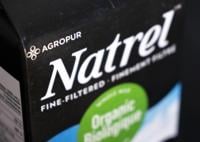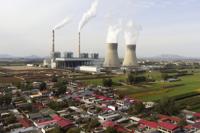MONTREAL - Quebec dairy giant Agropur is warning that the threat of a tariff war with the United States may force it to delay or rethink some of its planned investments. 
CEO Émile Cordeau said Wednesday that the uncertain economic climate means additional risk, which could push back the launch of some projects.
He said during a shareholder meeting Wednesday that the projects under review include initiatives to reduce the waste of non-fat solids, which is what's left over once water and fat have been removed from milk.
He said Canada lacks the capacity to process and transform the ingredients into products, an issue that's been highlighted by the infant formula shortages of recent years.
Agropur announced Wednesday that its profits and revenues increased during the 2024 financial year, which ended Nov. 2. 
Cordeau said the cooperative has managed to reduce its debt load in the last five years, which puts it in a better position to weather economic turbulence. 
The dairy cooperative, which includes brands such as Natrel, Qu├ębon and Oka cheese, has reduced its debt to two times its earnings before interest, tax and amortization as of November. This ratio reached 8.3 times in April 2020, during the COVID-19 pandemic, before dropping to between two and three times in 2023.┬á
"It's sure that the less debt we have, the more opportunities, that opens us up," Cordeau said. 
The company's annual report says Agropur has a number of ÔÇťhigh potentialÔÇŁ projects in Quebec and Atlantic Canada which will need government financing, and which Cordeau said could be delayed by the current economic context.┬á
He said forthcoming debates around supply management are adding to the uncertainty. 
U.S. President Donald Trump has voiced discontent about American access to ║┌┴¤│ď╣¤═° dairy markets, which was a major sticking point in North American free-trade negotiations during his first term in office.┬á
Cordeau is hopeful that the decades-old system that controls the supply of dairy products won't be used as a bargaining chip to appease the Trump administration, which is threatening to impose across-the-board tariffs on Canada next month. 
Supply management, he said, benefits not only dairy producers and processors, but also ║┌┴¤│ď╣¤═° consumers and the country's food autonomy.┬á
"If we remember the pandemic, not so long ago, not a single ║┌┴¤│ď╣¤═° ran out of milk," he said. "We really have a system that is robust and resilient and works very well in its current form."
It's unclear what will happen when the upcoming review of the Canada-United States-Mexico Agreement begins. As part of the free trade deal signed in 2018, Canada agreed to allow U.S. dairy farmers access to about 3.5 per cent of its domestic market, but the U.S. has since accused Canada of violating the pact.
Earlier Wednesday, Quebec Premier Fran├žois Legault maintained his support for supply management was "non-negotiable." Several federal ministers have also recently spoken up to defend the system.
However, Cordeau said Agropur will be able to adapt if things don't go the industry's way. 
"Will it be simple? Probably not, but the cooperative model was always resilient, and we'll adapt to what happens in the future," he said. 
Agropur's sales rose 6.8 per cent to reach $8.8 billion during the 2024 period, while earnings before interest, tax and amortization (EBITDA) rose 11.7 per cent to $609.6 million, according to the annual report given to members. 
Agropur will also pay $60 million to its 2,700 members in the form of rebates and repurchase of shares and debt securities, which represents an increase of almost 20 per cent compared to 2023. 
This report by ║┌┴¤│ď╣¤═° was first published Feb. 12, 2025.








































